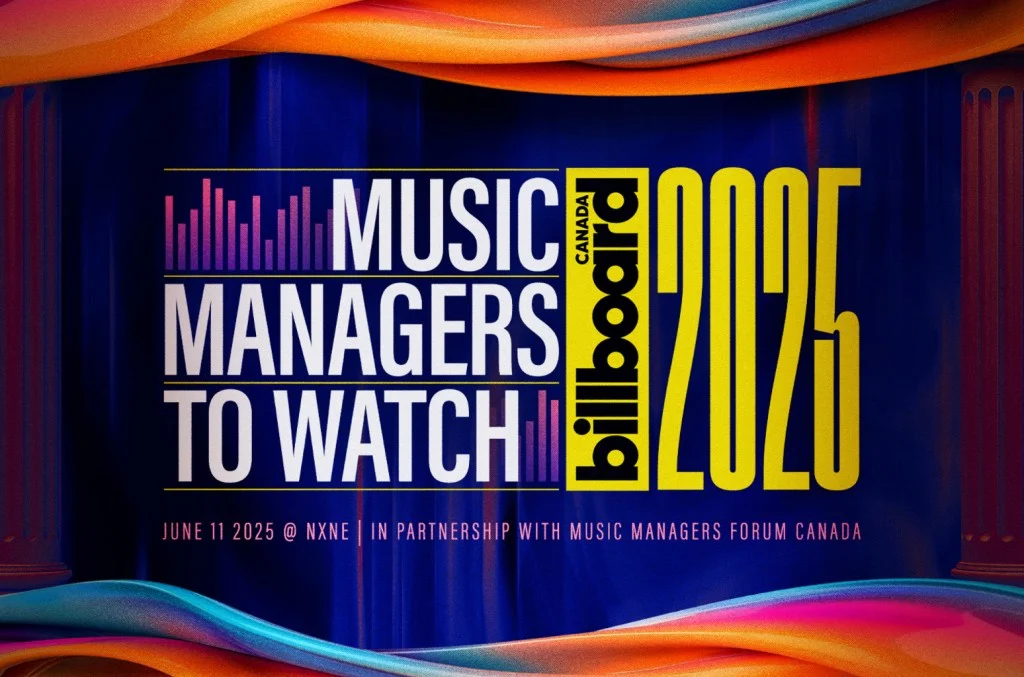International
Page: 4
Billboard Canada hosted its second annual Power Players celebration at Toronto’s Illuminarium on June 11, and the event brought out many of the most influential executives in Canadian music.
All three Canadian heads of the major labels were present, including Universal Music Canada’s Julie Adam, Sony Music Canada’s Shane Carter and Warner Music Canada’s Kristen Burke. Live Nation Canada’s Erik Hoffman and Melissa Bubb-Clarke — who, along with Riley O’Connor, were this year’s Power Players of the Year — were also at the event.
Derrick Ross of Slaight Music took to the stage to present the Impact Award. The honor was presented to Remix Project co-founder and October’s Very Own CEO Derek “Drex” Jancar, who was promoted to the role last year and continues to make a lasting impact in the business world, informed by his community impact.
Trending on Billboard
In addition to the award, the Slaight Foundation and Billboard Canada also presented Drex with a cheque for $10,000, representing a proud donation to the Remix Project.
Sony Music Canada’s Carter took to the stage to present the International Management Award to Courtney Stewart, Khalid’s manager and the founder of Right Hand Co. He recalled first meeting Stewart at one of Khalid’s shows and being instantly impressed by his drive and work ethic.
“Courtney has all the qualities that it takes to be not just a good manager, but a great manager and a great parent — two roles that are actually quite similar. For those of you who are managers, you have to be patient, kind, protective and unselfish,” Carter said.
“I am truly grateful for being recognized tonight, and I want to thank Billboard for all the great work that they do in the lives of artists,” Stewart said. “I am winning an award tonight, but the real win is what we’re doing for others. Uplifting other people, being a blessing to other people, uplifting other communities — that’s the real win. This win is not just about recognizing me, it’s about recognizing my right-hand team that’s so amazing and all of you out here because we have to come together to win — not for ourselves, but for other people.”
Hoffman and Bubb-Clarke were present to accept the Power Players of the Year Award, which also went to O’Connor, Live Nation Canada’s chairman.
“This is a crazy business we work in,” Hoffman said. “A lot has changed in the world of live music, but the one thing that’s remained consistent is that it is ultimately all about the artists and their fans. If we continue to work towards collective goals with that in mind, I think the world of live music will just continue to grow.”
Earlier that day, in the same venue, Billboard Canada hosted its first Managers to Watch event.
Billboard Canada national editor Richard Trapunski introduced the Billboard Canada Manager of the Year Award, which is given to a manager who exemplifies the vital work of the profession. “It’s a very special award,” he said. “It honours a manager who really takes things to a new level.”
Trapunski introduced The Beaches to present the award to their manager, Laurie Lee Boutet. This was prefaced by a speech from band member Jordan Miller, who reflected on how Boutet helped the group navigate the major obstacle of being dropped from its label and offered a different paradigm by not telling the band the same things every label did.
“She highlighted our strengths as four strong wild women, because that’s what she is too,” Miller said. “You are so much more than a manager. You are our sister and the fifth Beach.”
Boutet was moved by the speech and walked up teary-eyed to accept the award, first giving a nod to her peers in the room. “It’s an honour to be in front of all these people that I constantly text for advice,” she said. She described her experience managing the Beaches as the honour of her life, adding that they built something “feminine, genuine and really cool as f–k.”
Find all the Billboard Canada Power Players highlights here and Managers to Watch highlights here.
Daniel Caesar, Khalid and The Beaches Stun at Billboard Canada THE STAGE at NXNE
NXNE’s 30th edition was one for the ages. The long-running Toronto festival hosted the first edition of the Billboard Summit featuring A-list talent like deadmau5 and Punjabi superstar Diljit Dosanjh, as well as Billboard Canada’s first edition of THE STAGE.
Daniel Caesar played his first major headlining show at Mod Club in 2016. Returning to the same legendary venue after having reached arena headliner status, he treated the intimate show like a true homecoming. The Billboard Canada THE STAGE at NXNE show was by far the hottest ticket in town on Saturday night (June 14), and the lucky 500-plus fans in attendance were treated to something truly special from the hometown R&B star, who now lives in New York. It felt like something that could only happen once, at this particular time and this particular place, at this particular festival.
Instead of his full arena-style concert, Caesar opted for an acoustic set, sometimes with just him and his guitar and sometimes with accompaniment on keyboards or keys and drums. There was a spontaneity and looseness that connected him deeply to the audience, who knew every word to every song. It was reminiscent of Neil Young at Massey Hall in 1971, showcasing an artist who’s reached the heights of their career reconnecting with the true spirit of their early days with just a guitar, their beautiful aching vocals and the fans who’d been with them from day one. Though Caesar had worked out a large setlist (traded around on Reddit after the show), the singer-songwriter was clearly deciding which songs to play on the fly. He took requests from the audience, including rarities he hasn’t played in years.
Caesar even debuted a new song, “Moon,” which ached with the same tender vulnerability as his best music. When he first played the venue, he was in his early 20s. Now he’s 30: “Not young anymore,” he said but happy to see all the young fans in attendance. He was worried he was going to sob on stage, but instead got it all out of his system on the way to the venue, he admitted, passing all the pivotal spots of his youth.
Khalid filled up Sankofa Square on June 12 for a concert during which his fans showed up in droves to sing along loudly to several of his biggest hits. With four dancers in tow and a set full of undeniable bangers, Khalid put on a true standout performance in the heart of downtown Toronto at Billboard Canada THE STAGE at NXNE, which doubled as the festival’s 30th birthday.
From “Location” to “Young Dumb & Broke,” Khalid excited the packed square with songs from throughout his career. He even swiftly caught a friendship bracelet that was tossed to him by a fan and proceeded to make a heart gesture back at them.
Khalid was all smiles throughout his performance and received a roaring response upon asking if there were any day one fans in the crowd who have been following him since his breakthrough debut album, American Teen.
The Beaches are about to graduate to arena status, playing their hometown Scotiabank Arena this fall. But first, they had a special concert to play for more than 500 people at the Mod Club. It was a true hometown show for the band; as Eliza Enman-McDaniel put it, “I live a seven-minute walk away.” It also served as a full circle moment for Leandra Earl, who first saw the group’s previous incarnation, Done With Dolls, at the venue well over a decade ago before joining the band herself.
The viral success of The Beaches’ 2023 hit “Blame Brett” was not a one-off. The Toronto band has used it to propel themselves towards major rock stardom, and you could tell at this show. Taking turns on a platform onstage, they flexed their arena moves and propelled their songs with a particular new wave rhythm. The band’s Sunday night (June 15) show was one of the last of the festival, and its single “Last Girls at the Party” off the upcoming album No Hard Feelings felt particularly fitting. As the fans chanted along with the countdown in the lyrics, it felt like a catharsis to the whole week of NXNE.
Find all of the NXNE 2025 highlights here.
Creepy Nuts shared the details of its highly anticipated Creepy Nuts ASIA TOUR 2025 set to take place later this year. The “Bling-Bang-Bang-Born” hip-hop duo’s first-ever Asian tour will start in October and make stops in five cities including Beijing and Seoul. Ticket sales for each venue will begin at different times, so check out […]
Shubh’s rise has happened faster than he could have ever expected. In a quiet moment, Shubh softly remarks in Punjabi, “I didn’t think I would ever chart.”
Explore
Explore
See latest videos, charts and news
See latest videos, charts and news
He’s done more than that. The 27-year-old Brampton, Ontario-based Punjabi artist has become one of the most talked-about names in global music, amassing over 3 billion total streams across platforms, a fiercely loyal fanbase and a debut North American tour on the horizon, including arena dates in Oakland, Vancouver and Toronto. That’s all without a label or a single dollar spent on ads.
Around him, a pair of his close friends and Brampton housemates, Prince and Vicky, and his longtime manager, Shivam Malhotra, lean in, smiling – not just because the comment is modest, but because the reality couldn’t be more different.
Trending on Billboard
This is his first interview. It’s the first time he’s publicly reflecting on a journey that, in just a few years, has taken him from scribbling verses in a notebook to performing on arena stages across North America.
His breakthrough came when his debut album, Still Rollin, debuted at No. 16 on the Billboard Canadian Albums Chart in June 2023 and his sophomore album, Sicario, entered the Top 25 at No. 24 in January 2025. When he speaks to Billboard Canada, his single “Supreme” is making a splash on the Billboard Canadian Hot 100 chart following a No. 13 debut for the 2024 single “King Shit.”
But today, Shubh isn’t on stage, thinking about charts, or in the recording studio. He’s seated calmly at the studio for his first cover shoot for Billboard Canada, surrounded by the same team that’s been with him since day one. He answers slowly and thoughtfully, sometimes in Punjabi and sometimes in English. His friends and manager step in to help translate and interpret, not because he can’t speak the language, but because he’s never done this before and wants to express his clearest feelings.
Long before his tracks topped charts or racked up hundreds of millions of streams, Shubh was just a teenager filling notebooks with verses.
“I started writing when I was really young,” he recalls. “I’ve been writing for 12 to 13 years. I’ve always carried notebooks – almost like diaries – and that writing became the foundation of everything.” At the time, music wasn’t a professional ambition for Shubh. It was an outlet, a private ritual shaped by observation, emotion and self-reflection.
Today, that introspective process has evolved into a discography that’s earned him billions of streams, including nearly 400 million streams for his breakout single “No Love” and over 370 million for “Cheques.”
More than ten years later, that habit hasn’t faded. He still carries notebooks and pens wherever he goes, staying connected to the handwritten process that shaped his earliest songs. To this day, all of his songs begin on paper first.
Shubh’s path to this moment didn’t follow a script of a typical success story. He didn’t go chasing viral fame or visibility. In fact, much like fellow Toronto artist The Weeknd, he kept his face and his identity hidden in the early stages, letting the music speak entirely for itself. There were no flashy rollouts or trend-driven moves. Instead, he spent those years in quiet focus, writing relentlessly, experimenting with sounds and perfecting each track in solitude.
“My aim wasn’t attention, it was precision,” the singer says.
Much of that focus and clarity comes from where it all began. Growing up in Punjab, Shubh was surrounded by music at home, often hearing his father sing during family gatherings or daily routines. His father and older brother (Ravneet Singh, a well-known actor and singer) have been his biggest inspirations. They’re still in India, and he carries those memories with him everywhere. It’s that sense of home, that emotional imprint from his upbringing, that continues to drive him. It’s the quiet force behind the fire in his work.
In 2014, Shubh moved to Canada to pursue a degree in mechanical engineering at Sheridan College. “I came here as a student on a study visa,” he says. The early days weren’t easy. “I was a little bit nervous.”
Like many international students, he juggled homesickness, new responsibilities and the weight of starting over. Music wasn’t the goal then. It was more of a quiet companion. It wasn’t until 2021 that he decided to release his first song. His debut track “We Rollin” dropped without a music video and no press push. He didn’t even show his whole face, wearing a scarf over his nose and mouth. He wanted his music to reach people first.
And it did. Within weeks, the song was blowing up globally, with fans reaching out from countries like Japan and across Latin America. Now, “We Rollin” has surpassed 265 million views on YouTube alone, becoming the spark that launched Shubh into international recognition.
That initial wave of love changed everything. “That first song made me realize something special was happening.” But Shubh didn’t run to capitalize on it. He stayed in the studio, quietly focused on making better songs. “Sometimes I take two to three months to make just one song,” he explains.
“He gets into that shell, and he only comes out when it’s ready,” the artist’s manager Malhotra explains. For instance, the mixing process for his 2022 single “Baller,” one of his most iconic tracks, was so intense, it reached 29 versions before he was ready to put it out. “We did 28 mixes,” Shubh says, cracking a rare smile. “The 29th was okay, I guess. I still didn’t like it.” He only released it, he adds, because “deadlines” forced his hand.
Shubh puts his music through a rigorous test. He listens to each track hundreds of times. If he’s still not tired of it after 200 plays, that’s when he knows it’s ready for the world.
“Some of his songs average eight streams per user on Spotify,” Malhotra points out. “The industry standard is two or three – that’s more than double. It shows people aren’t just listening once, they’re coming back again and again.”
But it’s not just the replay value that sets him apart. Shubh isn’t just focused on lyrics and production. He’s also expanding the vocabulary of Punjabi music. “Every time, I try to bring something fresh,” he says.
A clear example is “One Love,” a reggae-leaning track inspired by Bob Marley’s legacy. “I used to listen to Bob Marley. Yeah, big Marley fan,” he says. The track, which dropped without a music video, has already crossed 400 million streams on Spotify.
Next on his radar? “I think I’ll try rock in the next two to three months,” he says. It’s not a stretch – he already performs live with a full band and skips backing tracks entirely. “I don’t believe in doing minus,” he says. “Everything is done live, start to finish.”
Musically, Shubh’s influences span decades and continents: Eminem, 2Pac, The Notorious B.I.G., 50 Cent, Dr. Dre. He speaks about them with deep respect, connecting their influence to his own path. Being in Toronto exposed him to global music culture, and Drake – another hometown hero – has had a huge impact. “I’ve seen how an entire culture has been built around Drake,” he says.
Living in Toronto has helped shape a global sound that can cross borders. Even though Shubh sings in Punjabi, the themes in his music – migration, longing, identity, his journey, perseverance – resonate far beyond the diaspora. “I write about what it feels like to leave home, move to a new country, and figure things out alone,” he explains. “It’s something a lot of people can relate to.” Fans who don’t understand the language still find something real in the flow and production. “People feel the vibe.”
He’s incredibly selective about what he puts out. No matter how polished a track is, if it doesn’t sit right with him, he won’t release it. That personal compass is why Shubh’s fans trust him. “For me, my fans are like family,” he says. “I reply to them online. I see everything.”
Despite avoiding public events and the spotlight, he’s always connected, just on his own terms. “Shubh has never spent a dollar on ads or marketing,” Malhotra says. “Everything has grown organically.”
Now, he’s preparing for his first North American tour, and he’s skipping the usual small venues to perform in massive arenas. “I never expected this,” he admits. “But I’m very happy that we’re performing in arenas.” The first venue? Oakland Arena on August 22, followed by Rogers Arena in Vancouver on August 23, and then Scotiabank Arena on September 5, where some of his heroes, including Eminem, have performed. He finishes the tour at the Prudential Center in New Jersey on September 7.
Shubh had never even been to a concert before stepping on stage for his sold-out show at Indigo at the O2 in London in 2023. “My voice was shaking,” he remembers. “I was very hyped up, but it also humbled me down.”
The surreal experience of performing live for the first time, without ever having seen a show from the audience’s side, marked a memorable moment in his journey.
He was supposed to go on a 2023 tour of India, but it was cancelled after backlash against a social media post he felt was politically misinterpreted. At the time, Shubh called the cancelled shows “disheartening,” and he’s been conceptualizing how to make his concerts even stronger since.
A short tour in Australia and New Zealand the same year brought him to major venues – something he’s looking to build on in Canada and the U.S.
Now that he’s ready to embark on his first North American tour, he’s been putting serious thought into every detail of his live shows: stage setup, sound, lighting, all of it. “I’m building something really special,” he says. “It’s never been done before in our scene.” The tour is a statement. As an independent artist, he wants to pave the way for others. “If I can buy a beat for $80 and get 300 million streams out of it, I believe anyone can do it,” Shubh says simply.
Now, Shubh already has his sights set even higher. “After this, I want to go to stadiums,” he says. “Then, I want to pack entire cities. That’s the vision.”
It’s clear he’s already thinking well beyond the present. Not because he’s in a hurry, but because he knows where this could go. He’s seen what happens when you lead your life creatively and with sincerity. He’s living proof that letting the music take center stage can open doors.
One phrase he keeps returning to during the conversation is simple but powerful: “keep trying, keep hustling, be consistent.” As he puts it, “If you bring honesty to your work, anything is possible.”
This Billboard Canada cover story originally appeared on Billboard Canada.
The Seoul High Court has sided with ADOR, the label behind K-pop powerhouse NewJeans, in an ongoing legal dispute that’s captivated fans and industry insiders alike.
On Tuesday (June 17), a panel of judges — Hwang Byung-ha, Jeong Jong-gwan, and Lee Kyun-yong — upheld a prior injunction barring the five-member group, currently promoting as NJZ, from pursuing independent activities outside of their exclusive contract with ADOR.
The court rejected the group’s appeal, stating there were no sufficient legal grounds to overturn the original decision, which was put in place to maintain the status quo of the contract.
Trending on Billboard
In their filing, the members of NewJeans argued that HYBE, the parent company of ADOR, had broken the trust central to their contract — pointing to HYBE’s internal audit and the controversial dismissal of former ADOR CEO Min Hee-Jin. They also cited a lack of support and neglect from the label as further grounds for appeal.
However, the court disagreed, finding no contractual clause that guaranteed Min’s position as CEO or producer. Judges emphasized that while the leadership dispute may have created tension, it did not invalidate the binding nature of the agreement.
The court further noted that HYBE had acted in good faith by establishing ADOR specifically for NewJeans and providing major support for the group’s debut and rise to stardom. Even after Min’s dismissal, HYBE reportedly offered to keep her involved in the group’s creative direction and later reinstated her as an internal director of ADOR.
In response to concerns about inactivity and career disruption, the judges concluded that any resulting harm stemmed from the members’ refusal to fulfill contractual obligations — not from actions by the company. They also emphasized that the contract had been individually negotiated and could not be considered an unfair, one-size-fits-all agreement under Korean law.
The ruling highlighted the potential financial damage to ADOR if the group were allowed to unilaterally terminate the agreement, a risk the artists had acknowledged at the outset. The seven-year term, the court noted, was clearly agreed upon by all parties.
With the decision, the court reaffirmed ADOR’s legal authority over NewJeans’ management and effectively shut down the group’s attempt to gain independent control of their activities marking a significant chapter in a legal battle that could reshape how artist-label contracts are viewed in the K-pop industry.
Universal Music Group has formally notified the European Commission of its intent to acquire Downtown Music Holdings for $775 million, triggering a regulatory review. Although the deal falls below the EU’s usual thresholds for antitrust scrutiny, authorities in the Netherlands and Austria referred it to the commission, which now must decide by July 22 whether […]
Billboard Canada Power Players is back for a second year, and it comes at a pivotal time for Canadian music. Canadian Content regulations — a principle that built the domestic industry — are up for review for the first time in a generation, with ongoing hearings taking place with the CRTC. The Online Streaming Act, meanwhile, is attempting to regulate major foreign streaming services to contribute to CanCon as the CRTC once did for radio — but companies like Spotify, Amazon and Apple Music aren’t taking it without a fight.
Those issues shadow the industry, which has recently seen both struggles and successes. The country was recently named the 8th largest music market in the world by the IFPI, and Toronto has emerged as a marquee live music market. That’s been reflected in the successes of and investments in new venues by companies like Live Nation Canada, MLSE and Oak View Group, who all appear on the list.
Trending on Billboard
As top execs at Live Nation Canada, Erik Hoffman, Riley O’Connor and Melissa Bubb-Clarke are orchestrating one of the most ambitious stretches in the company’s history. Together, the trio claims the No. 1 spot on Billboard Canada Power Players 2025. Already the biggest players in the Canadian music business, Live Nation is just getting bigger — and it’s on track for a record-breaking summer.
In the new Billboard Canada cover story, the three talk about their ambitious plans — including the about-to-open Rogers Stadium in Toronto, which will bring Oasis, Coldplay and BLACKPINK to the city this summer and triple the number of stadium shows.
Derek “Drex” Jancar of OVO Wins the Impact Award
As part of Billboard Canada Power Players, Derek “Drex” Jancar took the No. 1 spot in the Foundations category and accepted the Impact Award at the celebration in Toronto on Wednesday (June 11).
In the mid-2000s, Drex, Gavin Sheppard and Kehinde Bah co-founded The Remix Project, a community initiative that continues to influence global culture. Now, he’s doing it again as CEO of October’s Very Own (OVO).
On Wednesday night (June 11), Derrick Ross of Slaight Music presented Drex with the Impact Award as part of Billboard Canada Power Players 2025, with a donation to the Remix Project — a testament to the immense influence Drex has had within Canadian music and culture.
In an interview, Drex tells Billboard Canada about the impact of the Toronto community on all the work he does.
“It’s the nucleus of everything. It’s the thing you constantly come back to and think about: ‘Does this represent us, honestly and authentically?’” he says. “It’s where everyone worked on their skills and put blood, sweat and tears into their career paths. We obviously are global thinkers, but we’re always coming from that place. That’s our identity. It’s shaped us and it’s what makes us unique.”
Drex recalls meeting the key figures at OVO at Remix, including Oliver El-Khatib, Future The Prince, Niko Carino and Drake. The dedication that they poured into Drake’s burgeoning career in the late 2000s created a special energy in Toronto. He was already the hottest artist in the city, Drex recalls, but you could feel he was on the verge of becoming a global phenom — all while wearing his local connections on his sleeve.
“You could see what was happening behind the scenes, and it was really special to see everyone rally around and build such an amazing brand around him,” Drex says. “It was a time where you really started to believe in the city and the talent and the potential in the city and you were like, ‘Anyone can do anything from here. This is possible, it’s happening right in front of us.’”
The First Canadian Edition of Managers to Watch
Also this week, Billboard Canada unveiled its first Music Managers to Watch list.
Managers are the unsung heroes of the music industry. They are the hard-working decision makers behind some of the country’s most beloved artists. They make deals, orchestrate partnerships and make key strategic decisions. And though fans rarely know their names, they are key to the success of Canadian musicians. They don’t do it for personal glory, but to fulfill artistic visions that can break barriers and move millions.
These talented managers on the rise have helped some of the biggest artists tour stadiums, stun at the Met Gala or go gold without any label support. That’s an extra feat in Canada, where managers often have to navigate a tight-knit industry and geographic barriers to breakout success. In the feature, they share their tips for people new to the business and those who want to help introduce their artists to a global audience.
The list includes managers for Kaytranada, Jessie Reyez, Charlotte Cardin, Connor Price and more.
The Beaches’ manager, Laurie Lee Boutet, was named Manager of the Year. In an interview, she talks about how she helped navigate the Toronto band’s 2023 viral moment into sustained momentum on its way to its first hometown arena tour this fall.

In 2023, Believe CEO Denis Ladegaillerie told Billboard he was eying the U.S. Two years later, the Paris-based company is ready to expand its artist and label services business to the world’s largest music market.
“We’re building teams in 50 countries, and we’re going to build more in other countries, starting with the U.S. this year,” says Romain Vivien, global head of music/president for Europe. In fact, Believe is currently hiring a Los Angeles-based vp of labels and artist solutions for the U.S. who can “grow, scale and motivate high output teams,” according to the job posting.
Founded in 2005 by Ladegaillerie, a former Vivendi executive, Believe has done brisk business by focusing on large European markets and developing markets globally. From 2020 to 2024, Believe’s revenue rose 124% to 988.8 million euros ($1.05 billion) through organic growth and a mix of acquisitions and investments. Its portfolio includes German record labels Nuclear Blast and Groove Attack; French label PlayTwo; and Doğan Music Company, Turkey’s largest independent record label. In 2023, the company moved into publishing by acquiring U.K.-based Sentric Music Group for $51 million.
Trending on Billboard
The opportunity in the U.S. is immense — but the market is crowded. The U.S. accounted for 38% of global recorded music revenues in 2024, according to the IFPI. That’s 2.8 times more than Believe’s top two markets, France and Germany, combined. Competition in the artist and label services realm already exists from Universal Music Group-owned Virgin Music Group, Downtown Music Group (acquired by UMG but not yet approved by the European Commission), Sony Music’s The Orchard, and AWAL and smaller independents.
The Americas accounted for only 15% of Believe’s revenue in 2024, well behind Asia/Oceania/Africa’s 24% and Europe’s 61%, according to the company’s earnings report. Much of that Americas revenue came from U.S.-based digital distributor TuneCore, acquired by Believe in 2015, which had revenue of 64.6 million euros ($69.9 million) but was dwarfed by the 924 million euros ($1 billion) generated from Believe’s “premium solutions” business that spans record labels and services for artists, labels and songwriters.
But the current U.S. market is more amenable to an independent like Believe that has a digital-first mindset. Over the years, legacy gatekeepers such as TV, radio and brick-and-mortar retail — which are impediments or costly promotional vehicles for an indie artist — have waned in influence. The rise of TikTok, Spotify and YouTube presents “more opportunity to develop artists [there] digitally,” Ladegaillerie told Billboard in 2023.
In focusing on mid-sized and developing markets, Believe foresaw a global music business where streaming and social media create vibrant local music scenes. As an independent, Believe didn’t suffer from “the innovator’s dilemma” that might inhibit larger companies from pursuing small opportunities that could contribute significant revenue over time. Those mid-sized and developing markets produced music but organized themselves independently because major music companies were investing in larger markets in North America and Western Europe. When digital services like YouTube and Spotify took off, artists and labels needed digital distribution services and marketing expertise.
“It’s first and foremost about being here for the local community of artists in each local market,” says Vivien, “helping the rise of local artists to develop in their own country and then, of course, outside of their own market.”
India, where Believe has operated for more than a decade, is the company’s third-largest market after France and Germany, according to Vivien, while ranking No. 15 globally in 2024, according to the IFPI. Indian music is hyper-regional but takes advantage of global streaming platforms to reach Indian communities in Canada, the U.S. and Australia. A third of Believe’s Punjabi streams come from outside of India, Vivien says.
In the U.S. market, Believe will find a growing number of artists who want help building a career while retaining ownership of their rights. Independent distributors accounted for 91.8% of the 99,000 tracks uploaded to streaming platforms daily in 2024, according to Luminate, and independents’ recent share of current recorded music consumption has ranged from 15.6% in 2024 to 16.5% in 2022 by distribution. Within the major labels’ share is an increasing number of licensing deals and joint ventures that give the artist greater ownership control.
The exact terms of Believe’s client deals vary, but the company takes a share of the revenue generated by artists’ music. Vivien says the deals can vary from co-production deals to distribution-and-services deals. Believe can cover marketing, promotion, content creation, neighboring rights, synch, merchandising, branding and, in France, touring. Believe sometimes funds advances, too — as of Dec. 31, 2024, the company had 293 million euros ($305 million) of artist advances on its books.
The key, Vivien tells his team, is not to enter into a deal without “perfectly understanding” what the artist needs. “Some of them [have] very strong management. Some of them can produce,” he says. “Some of them are well funded, so they don’t need advances to produce their master. Some of them actually need funding. Some of them need marketing. Some of them are very local. Some of them need services outside of their market.”
Larger competitors have followed Believe’s emphasis on label services and emerging markets. In the last year, UMG acquired the remaining majority interest in [PIAS] and, through its Virgin Music Group, purchased Downtown Music Group. Sony Music bought artist services provider AWAL in 2021. Warner Music Group expanded its presence in India in 2024 through a partnership with Global Music Junction and an investment in live entertainment and ticketing platform SkillBox.
Believe went public in 2021 and was taken private in 2024 by a consortium led by Ladegaillerie and two investors, EQT and TCV. (In April, the company launched a bid to acquire the small number of remaining 3.3% of share capital, valuing the company at $1.75 billion.) The consortium survived an interested Warner Music Group, leaving Believe outside the control of the three major music groups. Not only did the move allow Believe to retain its independence, it left the company well funded to pursue its mission. As Vivien puts it, “We are entrepreneurs who are helping and serving other entrepreneurs.”

Serbia’s long-running EXIT Festival says that this summer’s edition of the event might be its last in the country.
The electronic event reports that its government funding and cultural grants have been revoked due to the festival publicly aligning with student-led anti-corruption protests that happened after the Novi Sad railway station collapse in November 2024, a tragedy that killed 15 people. The festival also says its sponsors have withdrawn due to pressure by pro-government entities.
“This is the hardest decision in our 25-year history but we believe that freedom has no price,” EXIT founder and director Dušan Kovačević says in a statement provided to media and posted to EXIT’s social channels. “With this act we are defending not only EXIT but the fundamental right to free expression for all cultural actors around the world. We invite them to stand with us in this fight.”
EXIT Festival is set to happen July 10-13 in Novi Sad, Serbia. The lineup features Tiësto, The Prodigy, Eric Prydz, Solomun, DJ Snake and many others.
Trending on Billboard
The event has a long history with pro-democratic movements, starting in 2000 as a pro-student movement meant to fight for freedom in Serbia and the Balkan countries. Happening at the Petrovaradin Fortress in the city of Novi Sad, the festival has won myriad awards that have distinguished it as one of the top festivals in Europe.
“Through music, creativity, and activism, EXIT has connected generations and nations, rebuilt broken ties, and built bridges where others route to divide,” Kovačević’s statement continues. “We have brought numerous European festival awards to our country and region, along with hundreds of millions of Euros in tourism revenue and international recognition that global experts consider invaluable.
“However, ever since we publicly stood with the students of Serbia in their fight for a freer and more just society, we have been subjected to immense financial and political pressures aimed at stripping us of our fundamental rights to freedom of thought and expression. Despite being completely cut off from public funding at all levels of government, and with some sponsors forced to withdraw under state pressure, we refuse to be silenced. As a result, this year’s anniversary edition will be the last to take place in a Serbia where freedom of speech is systematically suppressed.”
LONDON — The U.K. government shared its spending review on Wednesday (Jun. 11), Labour’s first since it won 2024’s parliamentary election. The U.K. music industry, however, has raised concerns that funds are not being prioritized for the sector and warned that “action is needed now” to ensure its stature on the global stage.
The review has been keenly anticipated as sectors look to Labour to stimulate the economic growth promised in its election manifesto. The last full spending review was issued by the previous Conservative government in 2021, but in July 2024 Reeves claimed the Conservative party had overspent by £21.9 billion ($29.6 billion) and that “a necessary and urgent decision” on budgets was required. The review sets out day-to-day budgets for government departments for the next three years, and details long-term investment plans until the end of the decade.
In the new review, chancellor Rachel Reeves shared spending plans for the NHS (National Health Service), and across housing, defense, transport and more. In recent months, the U.K.’s stakeholders have lobbied the Labour government for additional funds for the music industry, but their calls appear to have gone largely unheard.
Trending on Billboard
Last Thursday (May 29), an open letter from the PRS Foundation called on the government to pledge £10 million ($13.5 million) per year for music export and exchange, with the goal of promoting the U.K. music scene on a global stage. The letter was signed by over 350 figures in the industry, including Glastonbury boss Emily Eavis, Beggars Group founder and chairman Martin Mills and rock band Nova Twins. The signatories said the fund would “stimulate the long-term growth of the U.K. music industry” and pointed to South Korea and Australia as nations that had seen successful export programs in recent years.
Gee Davy, chief executive of AIM (Association of Independent Music), said in a statement to Billboard U.K.: “The U.K.’s music is a key element of our soft power, which creates jobs and value for the economy beyond some sectors receiving help in the government spending review. But a combination of economic shocks has hit our sector, with an amplified effect on grassroots and independent music.”
She added, “To regain our position on the global stage we urgently need the government to step in with an ambitious export strategy and commit to long-term investment, alongside incentives to boost music creation with a tax credit scheme similar to that in film. Action is needed now.”
There’s also concern about the Labour government’s commitment to alleviating the live music scene’s struggles in recent years. Recent data from the MVT (Music Venues Trust) indicates that two grassroots venues are closing every month in the U.K. and that the wider night time scene – including bars, clubs and suppliers – is suffering.
Michael Kill, chief executive of the NTIA (Night Time Industry Associations) says that while the government’s commitment to long-term energy infrastructure was a positive step, “venues are struggling to keep the lights on today” due to rising costs in operation. He outlined that the night time industry contributes £153 billion ($207 billion) to the U.K. economy every year, and employs 2.1 million people, but that businesses need “clarity” on what to expect in relation to business rates and potential tax hikes in the near future.
“We need a budget that understands our value, not one that inadvertently accelerates decline,” Kill said. “The government must work in partnership with us. The capital investment plans may look bold, but the devil is in the detail. We need immediate support, clear fiscal strategy, and genuine engagement ahead of the Autumn budget if we are to safeguard a safe, thriving, and sustainable night time economy.”
Music in education settings has also been a key area of focus in recent months with huge talent throwing their weight behind the cause. At the BRITs in March, rising star Myles Smith used his winners’ speech to call on the government to make music education more accessible in state schools. Ed Sheeran, meanwhile, led a campaign backed by Elton John, Harry Styles and Coldplay that called for additional funding for lessons and instruments.
Damian Morgan, employability and industry lead at dBs Manchester, says that the “U.K.’s global success in music is no accident – it’s the result of years of investment, opportunity and education. But right now, we’re at a critical tipping point.” The dBs institutes in Manchester, Bristol and Plymouth offer professional training for students with an interest in music technology, game design and the creative industries.
Morgan adds, “Without serious and sustained support, we risk leaving behind a generation of talent that simply can’t afford to access the opportunities others take for granted. We need the government to take this seriously: invest in music education, protect it in the curriculum, and ensure young people from all backgrounds can find their way into our world-leading music industry.”
CMAT’s newest single, “Take A Sexy Picture Of Me,” has a lightning-in-a-bottle quality that nothing she had released previously could quite compare.
The track, which will feature on the country-pop songwriter’s third LP Euro-Country (due Aug. 29 via AWAL), is bright, hooky and possessed of a subtle emotional pull. Under a soulful, spacious melody, the tone shifts continually: from self-reflection to blame-laying, from denial to weariness, frustration and regret.
So as much as this irresistible earworm encapsulates the Song of the Summer ethos with its easy, forthright and effortlessly cool arrangement, it also in a way defies it. It offers a pained and pointed depiction of body image struggles in a world of constant online commentary — evoking a sunlit mood with lyrics rooted in a wider, meaningful conversation. CMAT (an acronym of Ciara Mary-Alice Thompson) recently explained to BBC 6 Music that the track is about the mental anguish she has experienced, having previously received a flood of “nasty comments” on her physical appearance.
Trending on Billboard
Since its release last month, “Take A Sexy Picture Of Me” has taken on a life of its own, picking up significant traction on TikTok while also translating into real-world success. What started as a playful dance challenge by app user Sam Morris, a 37-year-old content creator based in Brighton, has snowballed into a trend. The routine follows along with the words of the second verse — “I did the butcher/ I did the baker/ I did the home and the family maker/ I did schoolgirl fantasies” — with participants miming chopping and baking actions.
Dubbed the “Woke Macarena” in reference to its simple choreography, the song has soundtracked over 28,000 TikTok videos in recent weeks, with stars such as Lola Young and Julia Fox getting involved. CMAT, meanwhile, is currently in the midst of an extensive festival run: at the end of May, she thrilled a Main Stage crowd at London’s Wide Awake festival, while a Pyramid Stage slot at Glastonbury is on the horizon. Last week (June 6), she supported Sam Fender at London Stadium in front of an audience of 82,500 — the venue’s biggest sold-out show to date.
Prior to this, CMAT and her band delivered an electrifying rendition of “Take A Sexy Picture Of Me” on Later… With Jools Holland, kicking off the Euro-Country campaign in earnest. The performance proved that she wants viewers to understand what she’s singing about on the deepest level possible, and if that requires theatrical emotions and dancing, she is more than willing to oblige. It wouldn’t be remiss, then, to suggest that prestige slots on U.S. late night shows may soon come along.
“CMAT is firmly and deservedly positioning herself as one of this summer’s breakout stars,” says Adam Read, music programs manager at TikTok UK. “This is a track that speaks directly to identity, self-image and transformation, all while being incredibly catchy. The fact that the choreography took shape organically and is now being performed at live shows by entire crowds is exactly the kind of cultural crossover we love to see.”
Unlike this time last year, when Sabrina Carpenter’s smash hit “Espresso” was dominating the British (and global) airwaves, there arguably hasn’t been a Song of the Summer frontrunner just yet. Alex Warren’s ballad “Ordinary” has remained firmly at the summit of the Official U.K. Singles Chart for the past 12 weeks — the longest-running U.K. No. 1 of the 2020s — yet its sighing, plaintive melody doesn’t quite speak to the easy-breezy feel of the season.
Read and the team at TikTok UK, however, have predicted “Take A Sexy Picture Of Me” as a contender, alongside Afrobeats star Darkoo’s “Like Dat” and Charli xcx’s “Party 4 U.” The latter is a 2020 fan favorite that peaked at No. 42 on the Billboard 200 last month (May 31), with Atlantic Records having pushed it towards U.S. contemporary hit radio over the spring.
With over 575,000 video creations under the #SongOfTheSummer hashtag, TikTok is a key launchpad for new music at this time of the year. CMAT, meanwhile, has gained over 26.6 million content views in the past month alone, leading to a 71% growth in her follower count and, in turn, pushing her monthly Spotify listeners over the 1 million mark. The song is continuing to climb Spotify’s Viral 50 — Global chart and is approaching 4 million streams on the service.
That begs the question: is this CMAT’s crown to take? The Dublin-raised musician has perhaps never been better primed to make a mainstream crossover. Her second LP, 2023’s Crazymad For Me saw her break the Top 40 on the Official U.K. Albums Chart for the first time (No. 23), while also scooping Mercury Prize, BRIT and Ivor Novello nominations; the former is a notable feat, given that 2022 debut If My Wife New I’d Be Dead failed to crack the Top 75.
Shrewd marketing from the Sony-owned AWAL, meanwhile, has also played a role in the success of “Take A Sexy Picture Of Me”; the track recently landed a glowing feature in The New York Times. “We realized very quickly that this would be an opportunity to broaden her out to new audiences,” says Victoria Needs, senior vp at AWAL. Having announced a worldwide deal with CMAT four years ago, Needs adds that the label’s vision for 2025 revolves around “solidifying her positioning in the U.K., Ireland and the rest of Europe,” as well as making “further inroads” in the U.S. with a North American headline tour booked for September.
CMAT finds herself in fine company on the world stage, with fellow Irish exports Fontaines D.C. and Kneecap having also pushed the needle forward in 2025. All three acts are making music with rich, defiant messaging, an attribute that chimes well with TikTok audiences, where songs can take off if they are attached to a particular story or movement; in this case, “Take A Sexy Picture Of Me” rings true with the collective female experience.
“CMAT is a great example of a real artist who has put in the work and has earned this moment,” AWAL CEO Lonny Olinick tells Billboard U.K. “Across three album campaigns, we have been fortunate to partner with her and do the hard artist development work that AWAL is known for, building her fan base from the ground up. We are all excited to see this powerful record connect with audiences globally.”

 State Champ Radio
State Champ Radio 







